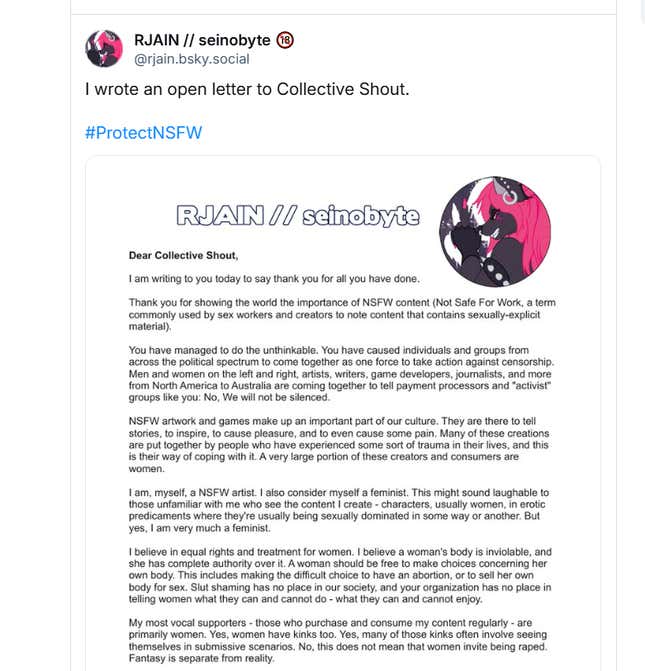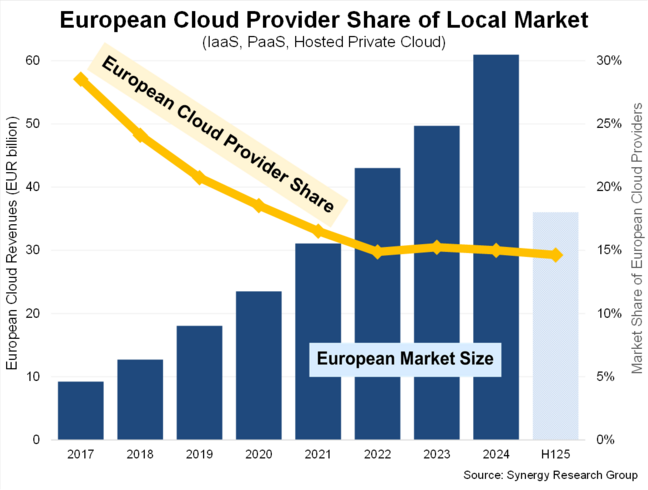European cloud infrastructure companies make up just 15 percent of their own market, and the huge investment the US giants can wield makes their dominance “an impossible hill to climb” for any would-be challengers.
Details shared by Synergy Research on regional markets show that Euro cloud operators continue to grow, but none comes remotely close to competing with the big American rivals for leadership of European markets.
According to Synergy, local companies accounted for nearly a third (29 percent) of cloud infrastructure revenues in 2017, but by 2022 their share had dropped to just 15 percent and has held fairly steady ever since.
European operators more than tripled their revenues between 2017 and 2024, yet the regional market as a whole has grown by a factor of six to reach €61 billion ($70 billion) in value, meaning the local players were simply outgrown by Amazon, Microsoft, and Google.
Those three global providers now account for 70 percent of the European market between them, while the largest regional firms such as SAP and Deutsche Telekom account for just a 2 percent share each.
This represents a sobering reality check amid calls for Europe to reduce its reliance on American-owned technology infrastructure, a call that gained momentum following the inauguration of President Trump and his administration’s confrontational stance toward others, particularly the EU.
As The Register reported earlier this year, data privacy worries have taken on new urgency following moves by Washington such as removing members of the US Privacy and Civil Liberties Oversight Board that safeguards data under the EU-US Data Privacy Framework, plus alleged flouting of federal data rules to advance policy goals.
And it can’t have helped that a Microsoft executive recently conceded during a French Senate inquiry that Microsoft “cannot guarantee” customer data sovereignty if the US government demands access, despite its many assurances to the contrary.
A group of nearly 100 technology companies and other organizations lobbied the European Commission in March for the creation of a sovereign infrastructure fund to invest in key technology so as to lessen dependence on US corporations.
French cloud biz OVHcloud also claimed – briefly – that it was working with the Commission to investigate shifting workloads to its platform from Microsoft’s Azure.
However analysts and other experts told us in May that decoupling from the big US cloud players would be difficult and is largely an unrealistic ambition.
“In theory, there’s nothing stopping European companies from repatriating their data and applications to European clouds, or even bringing everything back on-premise,” said Steve Brazier, former CEO at Canalys and now a Fellow at Informa.
“But in practice, it’s close to impossible. The barriers are significant, and they stack up quickly,” he added.
Synergy Research Chief Analyst John Dinsdale echoed this sentiment, noting that the sheer scale of the American operators and their financial clout has made it difficult for others to compete against them.
“As US cloud providers continue to invest some €10 billion ($11.7 billion) every quarter in European capex programs, that presents an impossible hill to climb for any companies who wish to seriously challenge their market leadership,” Dinsdale said.
“The cloud market is a game of scale where aspiring leaders have to place huge financial bets, must have a long-term view of investments and profitability, must maintain a focused determination to succeed, and must consistently achieve operational excellence.
“No European companies have come close to that set of criteria and the result is a market where the five leaders are all US companies,” he added.
European cloud providers have mostly settled into positions of serving local groups of customers that have specific local requirements, sometimes working as partners to the big US cloud providers, according to Dinsdale.
“While many European cloud providers will continue to grow, they are unlikely to move the needle much in terms of overall European market share,” he predicts.
European cloud infrastructure service revenues (including IaaS, PaaS, and hosted private cloud services) were estimated by Synergy to be €36 billion ($42 billion) in the first half of 2025, with revenues for the full year expected to be up by 24 percent year-on-year.
The largest cloud markets in Europe are the UK and Germany, but the highest growth rates are currently seen in Ireland, Spain, and Italy.
Public cloud Infrastructure-as-a-Service (IaaS) and Platform-as-a-Service (PaaS) account for the bulk of the European market and continue to grow more rapidly than hosted private cloud services, Synergy says.
However, AI is increasingly driving the market, with growth of 140-160 percent seen in GenAI-specific services such as GPUaaS and GenAI PaaS, the analyst claimed. ®














